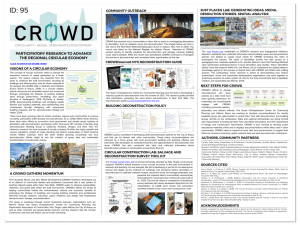
AAP Professors and Students created a video and poster about the Circularity, Reuse, and Zero Waste Development (CR0WD) Network and presented it at the Association of Collegiate Schools of Planning (ACSP) Annual Conference on October 21-23, 2021.
CR0WD is a network of on-campus and local/regional entities that conduct research and outreach related to conservation of the built environment and developing climate resilience. The network is researching the environmental impacts of building demolition, which is a massive source of pollution and landfill, and exploring alternatives to extend the lifespan of building materials that may otherwise go to landfill.
This faculty-student collaboration involved Associate Professor Jennifer Minner’s Just Places Lab, Assistant Professor Felix Heisel’s Circular Construction Lab, Historic Ithaca, the Susan Christopherson Center for Community Planning, Preservation Association of Central New York, FingerLakes ReUse, among a growing number of partners.
Student research team Jason Rearick (M.R.P. ’22), Melody Chen (M.R.P. ’23), Wyeth Augustine-Marceil (M.R.P. ’23), Mariam Fatima (M.R.P. ’23), Andrew Boghossian (B.Arch ’23), and Shriya Rangarajan (Ph.D. Regional Science) assisted Associate Professor Minner and Assistant Professor Heisel in creating the poster, contributing content, and presenting the poster for the ACSP conference.
To complement the poster, Chen created a video for the ACSP conference. Due to the quick turnaround time of the conference and COVID-related concerns, Chen found COVID safe spaces in Beebe Hall and Significant Elements to interview Minner, Heisel, Rearick, and Susan Holland (Executive Director of Historic Ithaca) for the video. Although originally created to complement the poster, Minner credits the video for taking on a life of its own and really standing alone.
Chen hopes that the video will serve as an important first step to bring awareness to and understanding of what a circular economy looks like. In addition, she hopes that this will bring a large-scale mentality shift that includes all constituents to the conversation.
Augustine-Marceil notes that the research team is hopeful for the passage of a deconstruction ordinance in the City of Ithaca that would require many, if not all, buildings slated for removal to be deconstructed as opposed to being demolished.
“This would ideally also incentivize more circular forms of construction that are built with future deconstruction and reuse in mind. If the ordinance is successful in Ithaca, we are hopeful to introduce legislation to do the same at the state level.”
image / provided